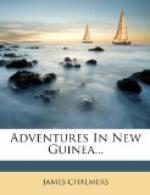We arrived at Port Moresby about six o’clock. I cannot say I was much charmed with the place, it had such a burnt-up, barren appearance. Close to the village is a mangrove swamp, and the whole bay is enclosed with high hills. At the back of the mission premises, and close to them, is a large swampy place, which in wet weather is full of water. There can be no doubt about Port Moresby being a very unhealthy place. We went ashore for breakfast next day, and in the afternoon visited the school; about forty children were present—an unusually large number. Many of the children know the alphabet, and a few can spell words of two or three letters. In walking through the village in the afternoon we saw the women making their crockery pots, preparing for the men’s return from the Gulf, the next north-west season, with large quantities of sago. We visited the graves of the teachers, which are kept in good order. They are all enclosed by a good fence. Within the same enclosure is one little grave that will bind New Guinea close to the hearts of Mr. and Mrs. Lawes. Over them all may be written—“For Christ’s sake.”
In returning from the graves, we met a man in mourning, whose wife had been killed in a canoe by natives about Round Head. He and his friends had resolved to retaliate, but through the influence of the teachers they did not do so. The teachers from the villages to the east of Port Moresby came in this afternoon, looking well and hearty. Some of them have suffered a good deal from fever and ague, but are now becoming acclimatized. The natives of the various villages are not now afraid of one another, but accompany their teachers from place to place. Men, women, and children smoke, and will do anything for tobacco. The best present you can give them is tobacco; it is the one thing for which they beg.
As it was decided that the vessel should not leave before Tuesday of the next week, Mr. McFarlane and I took a trip inland. I was anxious to see for myself if anything could be done for the natives living in the mountains. Mr. Goldie, a naturalist, with his party, was about ten miles inland. He himself had been at Port Moresby for some days, and, on hearing of our plans, he joined us, and we proceeded first to his camp. We left Port Moresby about half-past five on Thursday morning, and crossed the low ground at the back of the mission house. We ascended the hill which runs all along the coast in this district at a part about three hundred feet high, and then descended into a great plain. At present the plain is dry and hard, from the long drought, and very little of anything green is to be seen. There are a few small gum-trees, and great herds of wallabies were jumping about. The greater part of this plain is under water in the wet seasons. We walked about ten miles in an east-north-east direction, keeping the Astrolabe Range to our right, when we came to the camp, close by a large river—the Laroki. Being afraid of alligators, we preferred having water poured over us to bathing in the river.




